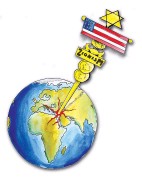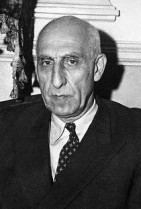The Internet, Fraudulent Freedoms and the Long Arm of Zionism


After a week of propaganda about
the wonders of freedom, democracy and online twittering, the
mask finally slipped - thanks to the self-promoting boastfulness
of a Washington Zionist.
We now know that while talking
about free exchange of political views on the Internet, influential
Zionists were actively trying to close down one side of the
debate, using methods illegal under UK law to block Iranian
political and media websites.
Josh Koster, a political consultant
who specialises in advice to American election candidates on
the use of the Internet, has boasted
in an article posted on 18th June: "I decided it was
time to cut off the flow" from Iranian websites.
What Koster did was to organise
a "denial of service attack". This is a method frequently
used by malicious computer hackers, by which repeated "hits"
are generated on a particular website, rapidly overloading the
servers on which the site is based. The
U.S. Government's National Cyber Alert System explains DoS attacks.
In his article Koster proudly points
out that by organising such attacks he temporarily closed down
the sites of the Iranian President
Mahmoud Ahmadinejad, the Tehran broadcaster IRIB,
and Iran's spiritual leader Ayatollah
Khamenei.
Koster's "denial of service"
attack generated intense web traffic (comparable to or exceeding
the traffic experienced by some of the web's most heavily used
sites) towards these Iranian sites whose servers were not equipped
to handle it.
Though often accused of paranoia,
in this instance the Iranian authorities did not anticipate
the shameless hypocrisy of Western "liberals", so
the sites briefly disappeared from the Internet until extra
server space could be organised.
However in the long term Josh Koster
and his allies may regret having revealed their disreputable
activities. A deliberate denial of service attack is illegal
in many countries, including Sweden and the United Kingdom,
where Koster's attack on Iranian web servers would be considered
a criminal offence under the Police
and Justice Act 2006, with a maximum penalty of ten years
in prison.
Though there is no such specific
law in the U.S. against DoS attacks, such behaviour would sometimes
be covered by several criminal statutes including the Computer
Fraud and Abuse Act. Earlier this year the Wall
Street Journal complained that Russia was carrying
out DoS attacks which closed
down web servers in neighbouring Kyrgyztan, but what was
allegedly outrageous behaviour for the Russians seems to be
celebrated when committed by Zionist Americans!
In his own country Koster has contravened
Twitter's terms of service, which state:
You may not use the Twitter.com service for any illegal
or unauthorized purpose. International users agree to comply
with all local laws regarding online conduct and acceptable
content.

Josh Koster (above)
used Twitter to launch an
illegal attack on Iranian web servers;
Twitter's co-founder was Isaac Stone (below)

While Josh Koster was abusing the
Twitter network to disrupt Iranian web servers another young
Washington Zionist, State Department official Jared Cohen, was
liaising with Twitter's senior management.
On 15th June Cohen contacted Jack
Dorsey, who co-founded Twitter with Isaac Stone, to ask that
scheduled maintenance work on Twitter's service should be delayed
so as to keep the network online during Tehran's daytime hours.
Cohen's boss at the State Department
- assistant secretary of state P.J. Crowley - maintained that
this was not part of any strategy of interfering in Iran's internal
affairs. He insisted that U.S. policy was to be:
proponents of freedom of expression. Information should
be used as a way to promote freedom of expression.
In which case one wonders how Mr
Crowley accounts for the other arm of the U.S. pincer movement
against Iran - the use of that same Twitter network not to promote
free expression but to silence Iranian news and political websites.
A cursory examination of his colleague's career shows that young
Mr Cohen (like Mr Koster) is interested in promoting a particular
agenda, not in a free exchange of ideas.
Jared Cohen (now 27) made his name
while a Rhodes Scholar at Oxford, where he obtained an M.Phil.
in International Relations and wrote a book, Children of
Jihad: A Young American's Travels Among the Youth of the Middle
East. His research for the book took him to Iran, Iraq,
Syria and Lebanon, where he became the leading American specialist
on Islamic youth and how in the rapidly changing demography
of the Middle East issues of youth culture could have a political
impact.
In a
November 2007 interview with the New Yorker magazine
Cohen told of his experiences of alcohol, drug taking and other
illicit activity on the fringes of the youth scene in the Islamic
world and explained:
Now I’m in a place [i.e. the U.S. State Department]
where I can take what young people are saying to me and work
with my colleagues in Operations and in the embassies to do
something that actually happens on the ground.
At the end of 2007 Cohen helped organise a conference in New
York titled "Alliance of Youth Movements", where young
people from countries including Lebanon and Saudi Arabia discussed
how social networking sites such as Facebook could be used in
political and social activism. Notably Google and Facebook have
chosen this week to launch Farsi versions of their services,
even though economic sanctions and current turmoil in Iran mean
this is scarcely a commercial proposition at this moment.
Cohen and others have been working on how pro-American movements
can be encouraged without obvious U.S. intervention, and he
has recently been working with Obama's special envoy to Pakistan
and Afghanistan, State Department veteran Richard Holbrooke.
He describes career CIA officer
and former Defense Secretary Frank Carlucci as "a wonderful
mentor to me". Carlucci served with the CIA in the Congo
during the overthrow and murder of the country's first post-independence
leader Patrice Lumumba, and was named in a film released in
2000 as having being involved in the killing.
During the past half century the
CIA has regularly used proxies - sometimes blatantly, sometimes
subtly - to overthrow democratically elected governments when
election results seem unfavourable to American interests. Examples
include:

Iranian Prime Minister Mohammed Mossadegh
Recent events suggest that blatant
paramilitary coup plots have been replaced (or supplemented)
by a more indirect war of cultural subversion.
This culture war is reminiscent
of the "cultural cold war" waged during the 1950s
and 1960s, when the CIA used various fronts such as the magazine
Encounter to promote cultural trends which were directly
(or often very indirectly) inimical to Soviet communism. This
historical topic is explored
at length by British historian Frances Stonor Saunders in
her book Who Paid the Piper?
The equivalents to Twitter in those
days were the CIA-controlled propaganda stations Radio Free
Europe, Radio Liberty and Radio Free Asia.
From the earliest days of the Internet
it has been predicted that the development of online communications
would have profound political implications, potentially liberating
individuals around the world from the stifling grip of prevailing
political orthodoxies. No longer dependent on corporate media
giants for their information, and no longer restricted to the
political choices favoured and funded by vested interests, citizens
would be able to hear a wider range of arguments, including
those unorthodox views previously marginalised or even demonised.
Predictably establishment forces have closed ranks to warn that
"extremists" have been able to exploit the increasing
freedoms of the new media age. The presence of channels such
as Press TV
and Al-Jazeera altered the world's perspective on the terrible
violence in Gaza a few months ago, where in past conflicts Israel
would have safely relied on friendly coverage from established
international networks.
Meanwhile Zionist campaign groups such as the Simon Wiesenthal
Centre have complained that the expansion of the World Wide
Web has allowed Israel's founding mythology to be challenged.
Writers and publishers such as Ernst Zundel, Robert Faurisson
and David Irving have been able to promote unorthodox research
on previously taboo topics such as the alleged "Holocaust"
of six million European Jews during the 1940s. In October 2008
the German and British authorities combined to execute a European
Arrest Warrant against the Australian academic Dr Fredrick Toben,
seized from a plane while in transit at Heathrow airport and
charged with having challenged orthodox interpretations of the
"Holocaust" on his Australian based website. This
warrant was eventually deemed invalid, but criminal proceedings
continue against Toben and his website in the Australian courts.
World Wide Web technology had the potential to be a liberating
force because of its infinite scope. Sadly we must recognise
that it also has the potential (like all the communications
media of the last century) to bolster the power of American
and Zionist interests.
The CIA's first "director
of political warfare", Frank Wisner, boasted that the Agency's
worldwide propaganda resources amounter to a "Mighty
Wurlitzer" - a gigantic musical instrument on which
he could play any tune in any style.
Wisner's typically American hubris
led him to mental breakdown and suicide, but his 21st century
equivalents in the Obama White House clearly hope that an online
"Mighty Wurlitzer" will help them destroy the only
challenge to Zionist power. The next few weeks will determine
whether the Internet is a force for pluralism or hegemony.